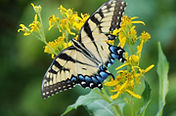bobcat (Lynx rufus rufus)
CONFIRMATION STATUS: Not confirmed.
CHARACTERISTICS: This is a medium sized cat with a total length
of 24-40 inches and a weight of 10-25 pounds. They have a very short
tail, relatively long legs and rather long, loose fur with longer cheek
fur forming sideburns. The upper parts are reddish-brown, spotted/
streaked with black, and below, they are white spotted/streaked with
black. The breeding season is from early January to March, and are
probably monogamous. A litter of 1-5 kittens is born in April or May
in a lined den. The female defends them strongly, even against the
male until about 2 months of age. Both bring meat to the kittens.
They have a swift, distinctive bounding gait, and are very secretive.
They are nocturnal and have a range from 5-50 miles in diameter.
Longevity in the wild is 10 to 14 years. The general trend shows that
there must be concern for bobcat in western Virginia due to the rapidly
increasing pressure from trappers.
DISTRIBUTION: The Barbours Creek section of Craig, Poor Valley
in Bland and Tazewell, parts of Augusta, the Alleghany Mountains
through Highland, Bath and Alleghany, the Massanutten Range, and
parts of Wise, Lee and Scott Counties hold the greatest concentra-
tions but it is present throughout Virginia. This species is generally
found in heavily forested/mountainous/rugged terrain, but may exist
in wooded districts near farms and human habitation. They show little
avoidance of any habitat type except in areas highly developed or with
dense human populations.
FOODS: The bobcat is a primary predator of small game, and only
occasionally kills livestock (individual, not habitual predation by all
bobcats). They are useful to the farmer since they kill rodents. They
take deer mostly in fall and winter just after hunting season (cripples
and lost kills). This species is an opportunist, and the more plentiful
wild animals become its staple foods.

Park Activities
Calendar of Events
Volunteer Programs
Sky Meadows Park
Location
Geography
Habitats
Trails
Visiting Park
Crooked Run Valley
Special Projects

